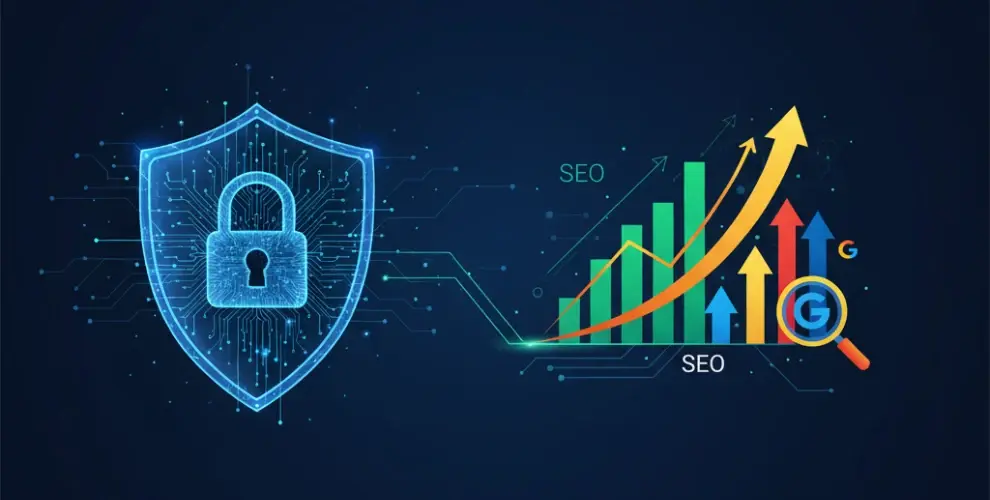
Cybersecurity Meets SEO: Why Google’s New Updates Demand Stronger Online Protection
Table of Contents
Introduction
The internet is growing smarter — and riskier. Businesses want to rank on Google, but ranking now means more than keywords and links.
Today, Cybersecurity and SEO work together to keep websites visible and safe. Google’s latest focus on trust and user protection means sites with weak security can drop in search results.
At WikiGlitz, we help readers stay informed about these changes so their digital presence is strong, secure, and ready for growth.
Google’s Changing SEO Landscape
Google’s search algorithm has evolved to reward not only relevance but also safety.
Google’s new update places a heavy weight on user experience and trust. A secure site is now a core SEO factor.
- Safe Browsing: Google flags unsafe pages and lowers their rank.
- HTTPS & SSL: Secure encryption is no longer optional; it’s mandatory.
- Site Speed & Protection: Malware or frequent downtime hurts SEO and user retention.
Websites that invest in online protection and network security show Google they value their visitors, making them more likely to rank higher and maintain consistent traffic.
Why Cybersecurity Is Now an SEO Priority?
Your search ranking depends on trust. If visitors see alerts about viruses or scams, they leave right away.
This hurts your bounce rate and search ranking. Strong cybersecurity keeps user data safe, builds trust, and protects revenue.
Think beyond SEO hacks — without cybersecurity online measures, your efforts on keywords and backlinks may vanish overnight due to a security breach.
Online Protection Beyond HTTPS
HTTPS is just the starting point. Online protection includes:
- Secure hosting & firewalls: Block hacking attempts before they reach your site.
- Malware scans: Detect and remove malicious code quickly.
- Data privacy measures: Safeguard user details and transactions.
- Regular updates & patching: Keep themes, plugins, and software safe.
These proactive steps protect your content and SEO efforts while building a trustworthy brand image.
Google’s safe-browsing systems reward sites that maintain ongoing cybersecurity online checks.
Network Security’s Role in SEO
Many ignore network security, but it’s critical for SEO.
- DDoS protection: Prevent downtime from traffic floods that can crash your site and hurt rankings.
- Fast, safe data transfer: Improves page speed, now a key ranking factor.
- Intrusion detection systems: Monitor unusual activity and block attackers.
Investing in strong network security means your website stays live, fast, and safe — which signals reliability to both users and Google.
Cyber Security Online Tools Every Site Owner Needs
Here’s a quick toolkit for better SEO and safety:
- SSL Certificates: Encrypt data and remove “Not Secure” warnings.
- Threat scanners: Identify malware or vulnerabilities before search engines penalize you.
- Two-Factor Authentication: Protect your admin access.
- Regular backups: So even if hacked, you recover fast without losing SEO progress.
Free and paid cybersecurity online tools exist, but pairing them with advice from cybersecurity companies offers deeper protection.
Learning from Cyber Security Companies
Top cybersecurity companies build trust by making security visible.
They:
- Monitor 24/7 for attacks.
- Provide audits showing weaknesses.
- Offer fast recovery after breaches.
Small businesses can replicate this by outsourcing some tasks while learning the basics in-house.
For SEO-focused sites, hiring professionals for the best internet security setups can save time and protect hard-earned search visibility.
Google New Update & Best Internet Security Practices
Google’s new update emphasises user-first security. Combining SEO with the best internet security gives your site an edge.
- Use trusted antivirus and malware blockers on your server.
- Keep login attempts limited and strong passwords enforced.
- Build user confidence with privacy policies and visible trust badges.
When users feel safe, they engage longer and convert more — metrics Google uses to rank pages. Safe websites now equal SEO success.
Practical SEO + Cybersecurity Checklist
A quick action plan to stay protected and visible:
- Enable HTTPS & SSL
- Install a strong firewall
- Scan for malware monthly
- Use secure admin passwords & limit access
- Monitor speed and uptime
- Add clear privacy & return policies
Pair cybersecurity online steps with regular SEO audits. The combined effort means higher rankings and stronger customer trust.
Conclusion
Search success now depends on safety. With every google update, Google rewards trust and penalises risk.
By investing in Cybersecurity — from network security to online protection — you not only protect visitors but also boost rankings and business growth.
At WikiGlitz, we break down complex digital changes into easy insights, helping you stay ahead, safe, and competitive.
Secure your site, protect your brand, and watch your SEO thrive.
Frequently Asked Questions
1. Why is Cybersecurity important for SEO?
It keeps your website safe from hacks, protects user data, and helps maintain strong search rankings. A secure site also builds user confidence, encouraging visitors to stay longer and explore more pages.
2. How do Google’s new updates affect online protection?
Google now promotes safe, user-friendly websites and lowers the ranking of those with security issues. This means better protection can directly boost your site’s visibility and organic traffic.
3. What tools help with cybersecurity online?
SSL certificates, malware scanners, two-factor authentication, and strong firewalls are essential. These tools also provide early threat detection, saving you from costly downtime or data loss.
4. Are cybersecurity companies worth it for small sites?
Yes, they help stop attacks, protect sensitive data, and keep your SEO performance stable. They also offer expert monitoring so small businesses can focus on growth with peace of mind.
5. How frequently should network security be reviewed?
At least once a month and after any major site updates or new features. Frequent checks help you fix weak spots quickly and maintain a safe browsing experience.
Want to keep up with our blog?
Our most valuable tips right inside your inbox, once per month.
WikiGlitz Team
Welcome to WikiGlitz, your ultimate destination for tech insights and innovation. Our expert team is dedicated to delivering free resources and professional advice on various technology topics, including Artificial Intelligence, Cyber Security, Cloud Computing, and more. We strive to empower our readers with up-to-date information and practical guidance, ensuring you stay ahead in the rapidly evolving tech landscape. At WikiGlitz, we are passionate about making complex technology accessible to everyone. Our team of seasoned experts curates content that is both informative and engaging, helping you understand and leverage the latest tech trends. Whether you're a tech enthusiast or a professional, WikiGlitz is your go-to source for reliable, expert-driven content. Join us on this journey to explore and embrace the future of technology.





